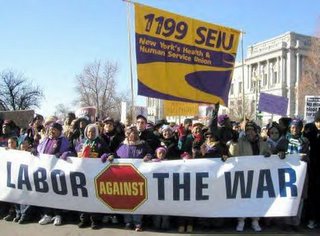
Future Hope column, Nov. 27, 2005
2006, 2008 and Beyond
by Ted Glick
Within progressive circles there’s growing talk about the 2006 and the 2008 elections. The Bush/Cheney free fall to an average, between them, of 33-34% in the polls, combined with the indictments and investigations of Rove, Libby, Delay, Frist and other top Republicans, has generated hope among Democrats and others that they can take back at least one house of Congress in 2006 and the White House in 2008.
For some Democrats, hopefully not many, who call themselves progressive, it doesn’t much matter who their standard bearers are. As long as they win against Republicans, that’s just fine.
I’d prefer a different electoral scenario. One aspect would be some strong, independent Congressional campaigns, Green Party or otherwise, that would result in at least one or two progressive independents to give Bernie Sanders some company. Another aspect would be primary challenges by progressive Democrats of pro-war, Democratic Leadership Council-type Democratic incumbents, the bringing down of some of them, and a Congressional makeup come January, 2007 that is decidedly more progressive as a result.
 Then, come 2008, building upon these political successes, a combination of Greens and other inde -pendents —perhaps the Millions More Movement?—putting forward an alternative to both corporate-dominated parties, on the one hand, and an energized and forceful progressive wing within the Democrats, on the other, will lead to an end of Republican control of Congress and the White House while strengthening mass-based, independent political efforts at local and state levels.
Then, come 2008, building upon these political successes, a combination of Greens and other inde -pendents —perhaps the Millions More Movement?—putting forward an alternative to both corporate-dominated parties, on the one hand, and an energized and forceful progressive wing within the Democrats, on the other, will lead to an end of Republican control of Congress and the White House while strengthening mass-based, independent political efforts at local and state levels.But there’s a huge asterisk which must be applied to these ideas. It’s the asterisk of the need for mass, popular, issue-based movements.
As someone who has labored in the vineyards of electoral activism for about three decades, I’ve come to appreciate both the value and the limitations of this kind of work.
 The value of electoral activism is that it allows progressives to put forward an overall platform of what we stand for, a progressive analysis of issues, to build organization in the course of a campaign and, if we win or do well, to have some practical impact upon what government does or does not do. These are all very important. As an activist working on climate crisis issues, for example, I know that having people in Congress who understand this issue and who are prepared to take action to reduce greenhouse gas emissions is an urgent necessity.
The value of electoral activism is that it allows progressives to put forward an overall platform of what we stand for, a progressive analysis of issues, to build organization in the course of a campaign and, if we win or do well, to have some practical impact upon what government does or does not do. These are all very important. As an activist working on climate crisis issues, for example, I know that having people in Congress who understand this issue and who are prepared to take action to reduce greenhouse gas emissions is an urgent necessity.Conversely, one limitation of electoral activism is that there is always a danger of individual candidates being seduced by the experience and putting themselves, their individual career advancement, ahead of the demands of the people who voted for them. Another is that, because of the winner-take-all nature of the U.S. electoral system, there is a decided tendency to engage in political compromise to increase the chances of winning office, such as progressive independents running on the Democratic Party line because of the difficulty of winning on an alternative party line in partisan elections.
This is where mass-based movement-building around issues comes in. When there is political movement, when there are large numbers of people coming out to meetings and demonstrations, when new activists are constantly adding fresh energy to the experiential wisdom of the long distance runners, then the inevitable pressures on progressives in office to compromise principles and bow to expediency can be fought as the movement demands accountability by those it helps elect. The movement(s) shape the issues and the approach to the issues, not the other way around. The movement(s) push their representatives in government to stand up to, expose and fight the certain efforts by political reaction to undercut and destroy our pro-justice efforts.
Without movement-building and independent political organization, we can be sure that most of those elected to political office will sooner or later let us down. Indeed, without that “outside” organizing, our standard bearers in office will not have the political strength to significantly advance our agenda even if they want to.
So as the gearing up for 2006, and then 2008, begins, let’s have some serious progressive dialogue not just about candidates for office and how to run effective campaigns but also about how those candidacies can be of use throughout 2006 to strengthen independent grassroots organization, multi-issue, multi-cultural coalition-building and visible mass movements on the issues. The times are too urgent for just “settling.”
Ted Glick is the coordinator of the Climate Crisis, USA Join the World! campaign and acting coordinator of the Independent Progressive Politics Network . He can be reached at indpol@igc.org or P.O. Box 1132, Bloomfield, N.J. 07003.
(Congress and White House photos by John Daly)
No comments:
Post a Comment